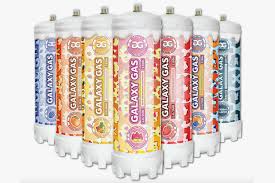
In recent years, a concerning trend has emerged among teens and young adults: the recreational use of nitrous oxide, commonly known as “whippets” or “laughing gas.” One brand that has gained attention is Galaxy Gas, often associated with the use of nitrous in party settings. While some may view this as a harmless way to enhance social experiences, the realities of nitrous oxide use carry significant risks and dangers that warrant discussion.
Nitrous oxide is a colorless gas that has legitimate medical uses, primarily as an anesthetic in dentistry and surgery. However, its accessibility in non-medical forms—especially through whipped cream chargers or canisters—has made it a popular choice for recreational use. Galaxy Gas, in particular, has marketed its products in a way that appeals to younger consumers, further facilitating this trend.
One of the most alarming aspects of nitrous oxide use among young people is its accessibility. In many regions, nitrous oxide can be purchased legally without age restrictions, making it easy for teenagers to obtain it. It’s often marketed as a harmless party enhancer, contributing to a perception that it’s safe for casual use. Online sales, convenience stores, and even local gas stations contribute to its widespread availability, allowing teens to experiment without much thought to the consequences.
While some may argue that nitrous oxide is less harmful than other recreational drugs, it poses significant risks, especially for developing brains. Here are a few dangers associated with its use:
- Physical Risks: Inhalation of nitrous oxide can lead to oxygen deprivation, which can result in fainting, dizziness, or even loss of consciousness. Repeated use can cause serious long-term effects, such as nerve damage, vitamin B12 deficiency, and potential brain damage.
- Psychological Effects: The gas can induce euphoric feelings, but it may also lead to anxiety, confusion, and hallucinations. These effects can be especially troubling for young adults still navigating their emotional landscapes.
- Accidents and Injuries: The euphoric effects can impair judgment, leading to reckless behaviors and accidents. Additionally, misuse—such as inhaling directly from canisters—can lead to frostbite or injury.
- Addiction: While nitrous oxide isn’t classified as an addictive substance in the same way as opioids or alcohol, habitual use can lead to psychological dependency.
Despite the challenges posed by Galaxy Gas and nitrous oxide use, there is hope for a shift in awareness and behavior. Education is key. Schools, parents, and community organizations can play a pivotal role in informing teens and young adults about the risks associated with nitrous oxide.
Initiatives that promote open dialogue about drug use can empower young people to make informed decisions. Programs focused on mental health, stress relief, and healthy social interactions can provide alternatives to substance use. Moreover, peer-led initiatives can foster a sense of community and support, helping to combat the loneliness and pressures that often drive teens to seek out substances like nitrous oxide.